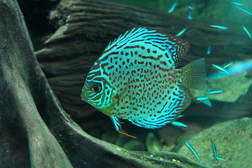 Discus fish by Drriss & Marrionn
Discus fish by Drriss & Marrionn GIVEN a healthy bank balance and a lack of concern for carbon footprint, it is still possible to witness the many splendours of nature – herds of wildebeest sweeping across the African plains, Icelandic volcanoes juxtaposed against glaciers, the death throes of our Great Barrier Reef …
Closer to home, for those of us with more modest budgets, there are frolicking whales, migratory shorebirds, even late-Cretaceous dinosaurs, to marvel at.
Many years ago I discovered a book by Konrad Lorenz, King Solomon’s Ring. The author related tales about the goings on of the various species surrounding his European home. It opened my eyes and mind to the study of ethology – how species interact with each other and their surrounds.
Once the enthused wildlife fancier moves beyond the stamp-collecting mindset of ticking off lists of species sighted, a whole fascinating world opens, where even the most mundane and common organisms reveal their beauty and complexity to those of us who take the time to really observe.
Take the wattlebird, often dismissed as a raucous pest who chases other birds from the garden. I suggest you sit quietly near a native shrub on a still, summery evening and enjoy the show. This nectar-feeder will be taking advantage of the cloud of insects attracted to the perfumed flowers of grevillea or banksia. Perched on a branch, the bird will suddenly launch, focused on a single, tiny insect, literally turning cartwheels in the air as it chases its chosen prey. This is known as hawking, and the skills and aerodynamics involved are far beyond anything we humans (or computers) could attempt, let alone accomplish. All this joy and fascination from a scummy and unloved wattlebird! I would bet that watching this display quietly and respectfully would deliver more mindfulness than any guru or adult colouring book. A native shrub, and perhaps a birdbath are the only requirements, along with a dose of patience.
My favourite method of studying – ethology – does not even require leaving my house. I keep two aquariums. Not the sterile bowl containing gormless goldfish. Mine house tropical jewels from the Amazon, although mine were spawned in the wilds of Oakleigh! One tank contains four discus fish. Brown, saucer-shaped bodies with scribbles of turquoise and deep red eyes. Their natural habitat is the mysterious black water of the Rio Negro River. They are about 18 months old, not yet mature, and behave remarkably like a flock of chooks. There is a definite pecking order. The largest is the boss, the next two want to be the boss, and the smallest is probably the smartest. It waits whilst the others are bickering and head-butting, and then swoops in to get the food. I feel that it will soon become dominant.
I hope they will soon reach sexual maturity. There is no sexual dimorphism in the discus; the males and females appear similar. If I have a compatible pair I will witness the spawning ritual and – hopefully – a brood of babies. Discus fish are exemplary parents. They care for the eggs and guard the young from predators, thus maximising the chances of passing on the DNA to a new generation. This care extends to a most unusual behavioural strategy. The new parents exude a thick mucus from their flanks, a type of mothers milk, upon which the young graze.
If you happen to have an electron microscope handy you would find that the tiny babies are equipped with a set of triangular teeth, perfectly adapted for the purpose. In relative terms, this set of choppers would be the envy of any pirhana! Nature really does think of everything.
Please take the time to really observe your surroundings carefully, and over an extended timespan. Whether it is watching the toadstools growing in the corner of a shower recess, the multitude of life in a coastal rockpool, or the pattern of clouds scudding across the Bass hills as a cold front approaches, there is much to be gained from pondering our surrounds.
Show your children and grandkids, and instil in them a sense of wonder and respect for our little bit of planet Earth – all will be enrichened.
Next time I will describe the goings-on in the other tank - a seething hotbed of lust, forsaken love and spousal abuse. When angels behave like devils ...